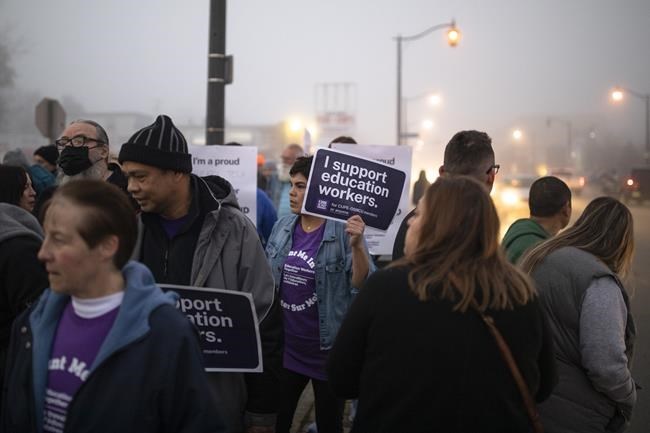TORONTO — A "frenzied and sleep-deprived" Ontario Labour Relations Board hearing to determine the legality of a strike by education workers stretched into a third and final day on Sunday, with a government lawyer arguing it doesn't matter whether the contract that now binds 55,000 employees was negotiated with their input or imposed upon them.
Ferina Murji said strikes are prohibited in the midst of any contract, not just one that was ratified by union membership.
"A collective agreement is a collective agreement is a collective agreement," she said.
Murji made the comments on the third day of arguments before the board after thousands of workers walked off the job on Friday in protest of government legislation that imposed a contract on them and took away their right to strike.
The government is seeking a ruling that their walkout is illegal, while the Canadian Union of Public Employees — which represents education workers — contends the job action is a form of legitimate political protest.
The strike closed numerous schools across the province Friday, with even more set to shut on Monday should the work stoppage continue.
"With 55,000 people not attending schools across the province, that means millions of students and their parents are left with nowhere to go, are left not learning, not getting the education that the Education Act ensures they will get," Murji said, stressing the importance of the board's intervention.
Board Chair Brian O'Byrne heard arguments over the course of 16 hours on Saturday, with the hearing stretching into early Sunday morning, before resuming just hours later, at 7 a.m.
As Day 3 of the hearing got underway, O'Byrne noted the "frenzied and sleep-deprived context of the hearings," which wrapped up on Sunday afternoon.
He said he'd work to come to a decision as quickly as possible.
"I honestly cannot tell you when I will get you a bottom line," O'Byrne said. "I'm going to try and do it by today. Hopefully I'll succeed."
Earlier in the proceedings, CUPE's lawyer argued that an imposed contract should not be treated the same way as one that was negotiated through collective bargaining.
"I do accept that Bill 28 is in writing. But it is not a voluntarily negotiated agreement," Steven Barrett said on Saturday.
"It is deemed to be a collective agreement under Section 5 ... but to call this a mid-contract withdrawal of services, as if this was a collective agreement freely negotiated, is a fundamental absurdity."
Barrett told O'Byrne that should he deem the strike legal, the job action could continue until the government repeals its new legislation or until the union and government negotiate its end.
The province's new law has set fines for violating the ban on strikes of up to $4,000 per employee per day — which could amount to $220 million for all 55,000 workers — and up to $500,000 per day for the union.
CUPE has said it will fight the fines, but will also pay them if it has to.
This report by The Canadian Press was first published Nov. 6, 2022.
Nicole Thompson, The Canadian Press



